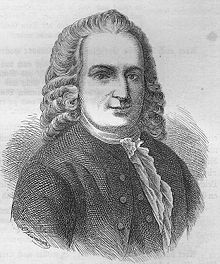music.wikisort.org - Poet
Johann Christian Günther (8 April 1695 – 15 March 1723) was a German poet from Striegau in Lower Silesia. After attending the gymnasium at Schweidnitz, he was sent in 1715 by his father, a country doctor, to study medicine at Wittenberg; but he was idle and dissipated, had no taste for the profession chosen for him, and came to a complete rupture with his family. In 1717 he went to Leipzig, where he was befriended by Johann Burkhard Mencke (1674–1732), who recognized his genius; and there he published a poem on the peace of Passarowitz (concluded between the German emperor and the Porte in 1718) which acquired him reputation. A recommendation from Mencke to Frederick Augustus II of Saxony, king of Poland, proved worse than useless, as Günther appeared at the audience drunk. From that time he led an unsettled and dissipated life, sinking ever deeper into the slough of misery, until he died at Jena on March 15, 1723, when only in his 28th year. Goethe pronounces Günther to have been a poet in the fullest sense of the term. His lyric poems as a whole give evidence of deep and lively sensibility, fine imagination, clever wit, and a true ear for melody and rhythm; but an air of cynicism is more or less present in most of them, and dull or vulgar witticisms are not infrequently found side by side with the purest inspirations of his genius.[1]
This article is largely based on an article in the out-of-copyright Encyclopædia Britannica Eleventh Edition, which was produced in 1911. (January 2021) |

Works
- Günther's collected poems were published in four volumes (Breslau, 1723–1735).[1]
- They are also included in vol. vi. of Julius Tittmann's Deutsche Dichter des 17ten Jahrh. (Leipzig, 1874), and vol. xxxviii. of Kurschner's Deutsche Nationalliteratur (1883).[1]
- A pretended autobiography of Günther appeared at Schweidnitz in 1732, and a life of him by Siebrand at Leipzig in 1738. See:[1]
- Hoffmann von Fallersleben, J. Gb. Günther (Breslau, 1833)
- O. Roquette, Leben und Dichten J. Ch. Günthers (Stuttgart, 1860)
- M. Kalbeck, Neue Beiträge zur Biographie des Dichters C. Günther (Breslau, 1879).
References
- One or more of the preceding sentences incorporates text from a publication now in the public domain: Chisholm, Hugh, ed. (1911). "Günther, Johann Christian". Encyclopædia Britannica. Vol. 12 (11th ed.). Cambridge University Press.
External links
- Works by Johann Christian Günther at LibriVox (public domain audiobooks)

На других языках
- [en] Johann Christian Günther
[fr] Johann Christian Günther
Johann Christian Günther (8 avril 1695 – 15 mars 1723) est un poète allemand originaire de Striegau, en Basse-Silésie. Après avoir fréquenté le gymnase à Schweidnitz, il est envoyé en 1715 par son père, médecin de campagne, pour étudier la médecine à Wittenberg ; mais il est paresseux et dissipé, n'ayant aucun goût pour cette profession, et rompt complètement avec sa famille. En 1717, il se rend à Leipzig, où il est recueilli par Johann Burkhard Mencke (1674-1732), qui a reconnu son génie ; là, il publie un poème sur la paix de Passarowitz (conclu entre l'empereur d'Allemagne et de la Porte en 1718) qui lui fait acquérir une certaine renommée. Une recommandation de Mencke à Frédéric-Auguste II de Saxe, roi de Pologne, s'avère être une erreur, puisque le poète arrive saoul. À partir de ce moment, il mène une vie incertaine, s'enfonçant toujours plus profondément dans le bourbier de la misère, jusqu'à sa mort à Iéna le 15 mars 1723, à 27 ans. Goethe estime que Günther a été un poète dans le sens le plus complet du terme. L'ensemble de ses poèmes témoigne d'une vive et profonde sensibilité, de beaucoup d'imagination, d'une certaine présence d'esprit et d'une vraie oreille pour la mélodie et le rythme ; néanmoins, un certain cynisme est présent dans la plupart d'entre eux, ainsi que des mots d'esprit insipides ou grossiers.[ru] Гюнтер, Иоганн Христиан
Ио́ганн Хри́стиан Гю́нтер (нем. Johann Christian Günther; 8 апреля 1695, Штригау — 15 марта 1723, Йена) — немецкий поэт эпохи Барокко, видный представитель так называемой «второй силезской школы», подражавшей французской поэтике; был признан и оценен Гёте как значительный лирик. Гюнтер — по преимуществу поэт узко субъективных интимных переживаний, наиболее характерный представитель богемы своего времени. Оказал некоторое влияние на Ломоносова.Другой контент может иметь иную лицензию. Перед использованием материалов сайта WikiSort.org внимательно изучите правила лицензирования конкретных элементов наполнения сайта.
WikiSort.org - проект по пересортировке и дополнению контента Википедии